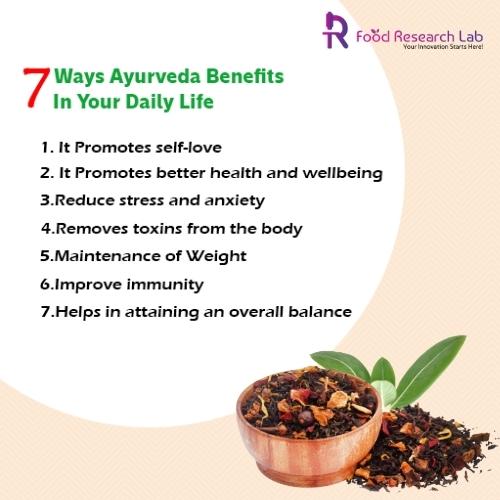Ayurvedic Diet Kit Formulation and Meal Planning
Ayurveda encompasses ancient traditional herbs that have for long been known to cure several ailments and keep you healthy and immune. Several diet kits such as the keto diet planning, paleo diet planning and many more include Ayurveda as a key element in changing the lifestyle. Ayurveda is a kind of holistic medicine that emphasizes maintaining a healthy body and mind. The cosmos is made up of five components, according to them;

Ayurvedic Concept
- Vayu-air
- Jala-water
- Akash-space
- Teja-fire
- Prithvi-earth
These components are said to combine to produce three distinct doshas or kinds of energy that flow inside your body. Each dosha is in charge of a particular physiological function.
The pitta dosha regulates appetite, thirst, and body temperature. Meanwhile, the Vata dosha supports joint function while the Kapha dosha maintains electrolyte balance and mobility.
The Ayurvedic Diet
The Ayurvedic food product development is a constituent of Ayurveda and has been practiced for thousands of years. It is based on identifying your dominant dosha and consuming foods that create equilibrium between the three doshas.
The good thing about the ayurvedic diet is that it sets the guiding principle for how, when and what you should consume centered on your dosha or body type. Here are certain necessary qualities of each dosha to help you figure out which one best suits you
- Pitta (fire + water): Intelligent, determined, and hardworking. This dosha is often of medium physical build, has a quick temper, and is prone to indigestion, heart disease, and high blood pressure.
- Vata (space + air): Inventive, energising, and enthusiastic. When out of balance, people with this dosha are generally slender and have a light frame. When out of balance, they may have stomach problems, tiredness, or worry.
- Kapha (earth + water) is a kind of energy. Natural calm, stability, and loyalty. Those with a Kapha dosha have a more robust build and are more likely to experience weight gain, asthma, depression, or diabetes.
Advantages Of Ayurvedic Food Formulations
- Most of the functional foods and ayurvedic supplements are unprocessed or minimally processed
- Diet is based on your type of dosha and is not restricted to a specific category
- Ayurveda diet encompasses the health of both the mind and body
- The diet helps maintain a healthy body weight
- It is flexible for all age groups
- It is sustainable and eco-friendly
The Ayurveda diet also comes with a few cons. Since the Ayurveda diet is based on dosha, it is hard to precisely specify your dosha type unless you can acknowledge it yourself or get the help of a trained professional. Most Indians intake Ayurveda powders without proper food consultation, resulting in side effects such as body heat and restlessness. Also, there are many restrictions in diet which you have to follow while following a specific diet which is a tedious task. Food Research Lab has a nutrient expert service through which we offer our clients diet kits and consultation.
Ayurvedic tips when following an ayurvedic diet
Take a glass of boiling water (at room temperature) when you wake up. The digestive system is activated, and fluid loss is balanced. Lemon juice can be added to taste.
- Warm food is simpler to digest since it needs less energy for the gastrointestinal system to breakdown it.
- Only natural, fresh, regional, and seasonal ingredients are used. While the food is still fresh, gently prepare it.
- Don’t overindulge. Slowly chew so you can tell when you’re full and don’t put too much food in your stomach. Do diet kit planning accordingly.
- Avoid combining dairy products with acidic fruits. It’s best to consume fruits first thing in the morning or steam them.
Your dosha determines the things you should eat to maintain inner equilibrium. The pitta dosha, for example, prefers cooling, energising meals and avoids spices, nuts, and seeds. The Vata dosha prefers warm, wet, and grounding meals while avoiding vegetables, dry fruits, and certain herbs. The Kapha dosha includes legumes, vegetables and fruits. Food items such as seeds, nuts and oils are restricted. All three doshas should avoid red meat, artificial sugars, and processed foods. Instead, the Ayurvedic diet promotes the consumption of nutritious whole foods and one can always choose healthy herbal product development from a credible consultant. Sometimes, it can be tough to plan ayurvedic diets because of the complexity of ingredients.
Food Research Lab’s Ayurvedic diet plan
Food Research lab provides suitable diet kits considering all the aspects of Ayurveda, saving the work for Ayurveda centres.





